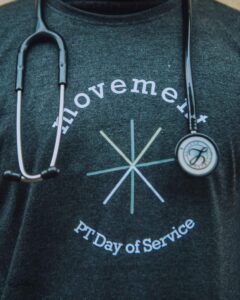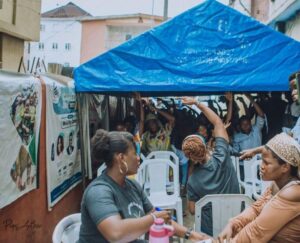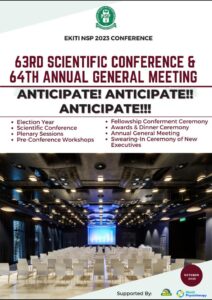Annually, the World Physiotherapy Day takes place on 8th of September. In commemoration of this year’s World PT Day, our correspondents interviewed – one of the young, most prominent physiotherapists in Nigeria, who is also the National Public Relations Officer (PRO) 1 of the
Medical Mirror Correspondents: Tobi Ogunlade, Temitayo Olatunji and Kemisola Agoyi Awoniyi.
MM: Can you introduce yourself Sir?
My name is Adejugbagbe Muyiwa Kenneth, I am a physiotherapist and I have a bias towards Neurorehabilitation – which is my area of speciality i.e., Adult Neurorehabilitation. However, I recently delved into Physiotherapy in Acute Care and Frailty especially with the geriatric population.

MM: How long have you practiced Physiotherapy and what was the motivation in wanting to be a Physiotherapist?
I graduated from the University of Lagos, Nigeria – the University of first choice, the nation’s pride – in 2014. If I were to do the math, this is about the ninth year, almost a decade, of me practicing as a Physiotherapist. And I am proud and happy I am one.
My motivation was a lot of things. But of course, when I was in Secondary School, I did not know any better. As it is always customary that if you are the best-graduating student, people just believe you should be in science class and if you happen to be in science class, they assume you should study Medicine. Back in the days, being a Doctor, a Pharmacist, a Lawyer or an Engineer, any of those was a popular profession. I wished I had known better; I wouldn’t have studied a medical course (Laughs). But regardless, I am happy. Also, I think I have the satiety – this satisfaction within me – that I am privileged to be in a profession where I can put smiles on people’s faces and help alleviate their pains, prevent deformity, improve their quality of life, add to their number of years in a way and promote their functional independence.
Independence is what everybody wants – no matter how aged you are, you want to be independent as much as possible. This is something I appreciate and has been one of my motivations in physiotherapy practice.
Another personal experience that further motivates me, was an occurrence with my grandmother – the Ariwajoye Adejugbagbe. I remember vividly that she suddenly came down with an ailment; which caused her to lose strength in both lower limbs. With my knowledge of medicine now, it was most likely an autoimmune condition, but at the time, we didn’t have a substantial diagnosis. Reflecting on it in this moment, it could have been transverse myelitis or motor neurone disease or something similar. But then, there was no rehabilitation, nothing! After she was stabilised and her vitals were good, she could not regain her ambulatory skills until she passed away – she was bedridden and confined to the use of a wheelchair. I remember the struggle back then, going round to different places to get her back up. We even went to one of Reverend Reinhard Bonke’s crusades in Ondo State, hoping to get some healing and deliverance for her, but unfortunately, we didn’t get it.
If we had known better – when she suddenly deteriorated and was losing the strength in her lower limbs – maybe a little about Physiotherapy, maybe things would have been different. Even now, I am certain that if we had known something about Physiotherapy, things WOULD HAVE BEEN DIFFERENT. This, I would say, was my very first motivation and of course, I have had more continuous motivation by seeing my patients every day. Which makes me want to learn more, since I can be of value to them (my clients) and make a difference in the health space.

MM: Physiotherapists are said to be the most pleasant medical professionals to work within the hospital. Is this true and if yes, what contributes to this sir?
Yes, I will say that we are pleasant but not the “most”, or maybe we are (Laughs). Physiotherapists are pleasant because if you want your patient to do something, you just have to be pleasant. Imagine a Physiotherapist in specialties such as paediatrics, and geriatrics and not pleasant, such a physio will struggle. For instance, you want an elderly man who has already seen everything in life to lift his leg and do some exercises. It’s going to require you to be very pleasant, and charming, in addition to your great clinical skills. You need all the tricks to get them to be engaged and active in your treatment session. Also, you have to spend quality time with them – an hour, two hours – and if you are not pleasant, they will send you out.
However, by the virtue of our training, we are pleasant, because we are ethically bound to be respectful and receptive to our patients. We understand the fact that our patients have autonomy, and they can take decisions for themselves. Beyond that, we understand the principle of “do no harm”. As believers of teamwork and collaboration; we engage the services of other members of the MDT and make referrals when necessary. We aren’t an island of knowledge, on the contrary, PTs are ardent practitioners of multi-disciplinary teamwork.
When we need to, we speak with the Nurses, Physicians, Medical laboratory scientists, Radiologists, Pharmacists and so on. This is so we can fully understand what is going on with our patient, know if there would be any interaction with their drugs and so on. Hence, with that vast amount of information and knowledge, you have no choice but to be pleasant, respectful, and cautious towards your patient. So, I agree with you that we are the best (Laughs).
MM: In the context of providing wholesome care to patients, from your experience, how has the synergy been between Physiotherapists and other healthcare providers? Has the relationship been smooth, or work needs to be done?
I will say it is improving. I remember some time ago, I was talking about the fundamental principles of primary health care, multi-disciplinary, inter-disciplinary and trans-disciplinary approaches and this included people not in the medical or core clinical practice, for instance the cleaning staff. The synergy and harmony must be there – because in cases where this is not, your cubicle or the ward might not be clean enough – as everyone has a vital role when it comes to healthcare.
In hospitals, we have a lot of specialists including the Surgeon, the Physician, the GP for patients in primary health care, the Medical Laboratory Scientist, the Dietician and Clinical Nutritionist, the Nurses – who now have specialist nurses and support staff such as auxiliary nurses and health care assistants. As Physiotherapists, we need to work together with everyone, and I want to believe our relationship is significantly improving. Particularly, we work closely with the Orthopaedic Surgeons and even the Neurosurgeons. I know a lot of times we have organized webinars or conferences as Physiotherapists, and we have had to invite Radiologists to discuss MRI interpretation, or Pharmacists to organize CPD courses to better understand pharmacodynamics as it relates to rehabilitation, and so on – because we believe healthcare is a continuum.
We all look forward to a synergised healthcare setting, because it is all about patient-centred care – not about who takes the glory but about getting the patient whole. Because I can tell you as human beings, we all are going to be patient one time or the other. Meaning, we are all potential patients, if we are not currently or have been one already. Therefore, everybody must come together towards quality patient-centred care provision.
If all you have to do is the 2 hourly regular turning and positioning of a patient to prevent pressure sore, that is very vital and must be done appropriately and with dedication. Because some time ago, I was looking at a study on the amount of money spent on the treatment of pressure sores and the impending doom that it brings in terms of infection, skin loss or even deterioration of the patient’s health and psychological wellbeing – from seeing one’s own skin peel.
Really, every one of us – even including the Clinical Physiologist, Exercise Physiologist – all have vital roles to play. Though, we have not gotten to the apex of multi-disciplinary care like we see in other countries. But I believe in Nigeria, we are improving and Physiotherapists are very much receptive to improving that collaboration and synergy between us and every other member of the health care system.

MM: In very basic terms, what does the practice of Physiotherapy entail? Who are the patients who would benefit from Physiotherapy?
Physiotherapy is about optimization of function, amelioration of pain, improving quality of life, habilitation and rehabilitation to regain functional independence in performance of basic and instrumental activities of daily living. Now, you see why we need to recruit enough Physiotherapists for the different types of rehabilitation to get patients back to their pre-injury state of functionality and independence – no one should be denied this after being ill or hospitalized. It is all about improving the quality of life of individuals (both the ill and the apparently healthy ones) – so that they can go back to their occupations, which they were doing before an ailment or injury. For example, if a person suffers contractures from burns, a lot of rehabilitation will be needed. These include stretches and some gentle grading mobilization to get the full functionality of their joints for motion. Beyond going for surgeries such as total knee or hip replacement, PT is needed to help the patient walk, strengthen the use of their lower limbs, hip stability, agility, coordination, balance and even how to manoeuvre motions around objects. Also, as Physiotherapists, we do gait observation and analysis. These are cardinal and crucial in achieving optimal results with our patients and helps to make all the hardwork of our physicians and surgeons show forth. Absence of PT does not make the beauty of their work come out – as it should be – and this affects the overall outcome of patients.
Therefore, we must all come together – since it is all about the patient. Keeping in mind that, if any of us – be it a Nurse, Doctor, Radiographer, MLS, or Rx – should be admitted in a hospital for something traumatic or fatal, “how would we want to be attended to?”. I believe that the golden rule “do unto others as you want it to be done to you in life” is a boomerang. Hence, we have to be careful of what we do, plus the sky is so big for anyone of us to fly and thrive at the same time – there should be no room for unhealthy rivalry.
MM: As PRO of your association, you’re very much in the know about the state of the practice of Physiotherapy and the challenges facing Physiotherapists. Can you enlighten us on a couple of these challenges?
As the National Public Relation officer (PRO)1 of the (NSP) – which is like NMA for the medical doctors – we are about six thousand members in Nigeria. However, one of the major challenges facing us across the country is under-representation and inadequacies of Physiotherapists. In terms of the ratio of Physiotherapists to Nigerians, we are getting closer to a population of two hundred and twenty million, even using the official figure of 200 million Nigerians, and when you divide that by 6000 physiotherapists; the ratio is nothing to write home about.
Just a bit of comparison with the United Kingdom. According to the HCPC website, in England there are about 41,000 chartered PTs, in Scotland there are 4,200, as well as others in Wales and Northern Ireland. Nigeria’s population is times 3 or 4 of the UK, unfortunately we only have 6000 PTs and this is something we urgently need to look into. Also, despite the fact that we don’t have enough Physiotherapists, how many of us are being employed by the Government? When in a Teaching or Federal Hospital, we have less than 20 permanent physiotherapists to cater for ALL patients. This abnormality in government employment needs to be fixed as a matter of urgency.

Likewise, specialization within the profession is another challenge that we have to look into. Because, as of today, we have people within the health space who are working against the actualization and realization of specialties for PTs in Nigeria. Thankfully, now in Nigeria, we have the Postgraduate Physiotherapy College – where after graduation, depending on the number of years one has been practicing and their clinical experience – one can then further his or her studies to specialize. Be it as a Neurophysiotherapist, Physiotherapist in Women’s Health, Paediatric Physiotherapist, Orthopaedics and Trauma Physiotherapist, Sport or Musculoskeletal Physiotherapist, Ergonomics/Industrial PT. Despite having this PT postgraduate college, we have been trying to get our specializations approved with a lot of lobbying, but unfortunately, we have some agents that are really just saying “no, we don’t want that”.
This reminds me of the series of ASUU, NUC and JOHESU saga, when the Pharmaceutical Society of Nigeria was giving an insight into what they had to go through before they could actually get their own (postgraduate specialisation) recognized, as well as the experience of the Nurses. Albeit, the human body is so complex, beyond what one individual or a singular set of professionals can optimally care for.
Let us take a cue from the medical practice amongst physicians, where in a speciality like internal medicine, they subspecialize to focus on their niche and become an expert. For instance, among surgeons, we have those who work on the spine and brain called the neurosurgeon. Those who deal with ear, nose and throat called the ENT specialists and those who deal with bones called the orthopaedic surgeons. These diverse specialities cut across the healthcare professions. Another case in point is the medical laboratory sciences, where we have those in chemistry, others in haematology, and some in genetics. Even among nurses, no one just wants to be a general nurse anymore. Now, we have renal nurses, cardiac nurses, theatre nurses and so much more. Which makes sense, because only one person cannot be in the theatre, on the ward, attending to children and adults at the same time.
To be candid, one person cannot know it all, to avoid mistakes. One person cannot be the one rehabilitating a stroke patient in the community/outpatient setting, and still be the same person helping the patient to recover from surgery in the theatre setting. Also, because the era of “gbogbo nise” – when the Nigerian health practitioner is seen as God – is over. If we say we are providing “patient-centred care”, then it must show in our provision of specialist care to our patients. No one has the monopoly of knowledge, as regards the human body. At this point, the era of general practice is far gone.
In summary, employ more physiotherapists with competitive remunerations and government should fund specialties trainings through the Physiotherapy Postgraduate College.
MM: In regard to these issues touched above, what solutions are being put in place to mitigate them?
I must say, Nigeria is a very complex country. However, we will keep advocating and highlighting our issues through all the mediums available. So that our people in other professions can see that we all have to come together. There shouldn’t be a fight between JOHESU and NMA, because personally, I would not want to make an enemy out of anyone – talkless of a colleague. In this era we find ourselves, we should all set our differences aside, and work towards the common goal.
I have been opportune to travel out of the country and have seen how things are done in saner climes – healthcare should be all about the patient. And the goal should be about delivering that care in an excellent and outstanding manner. So that in Nigeria, when people see what we are doing, we begin to get the international recognition and grants we deserve. Also, people start to believe in our expertise, and health workers can derive job satisfaction with corresponding remuneration in whatever area of speciality, wherever they work.

This is – as well – how to diminish the massive brain drain we are currently experiencing in Nigeria. We are one and we need to collectively clamour for the change we want to see in our systems. A nurse or doctor doing multiple jobs to make ends meet is not the best way to improve loyalty or productivity of such clinicians. It is really sad, what health care professionals out there are earning and the horrendous working condition that many of us are subjected to work in. We hope to do better, but my fear is that those who complained back in the days are towing the wicked and terrible practices that they complained about in their time. All hands must be on deck, and as we do that, we must remember- I need not snuff out your light, as it will not make mine to shine any brighter. The sky is big for everyone to fly. The health space is big enough for the pharmacist, surgeon, nurse, and physiotherapist – to become a director or a consultant in their area of expertise, so do not serve as an obstruction.
Another mess we find ourselves in is allowing the least qualified or competent people in leadership positions. In this 21st century with technological advancement, this shouldn’t be. For instance, having professionals with low qualifications or people with zero credentials as CEOs, MDs or in ministerial and other government positions – just because it’s favourable to some, at the jeopardy of about two hundred million people is ironical. Today, we have people who graduated as the best from their institutions being led by people who barely have WAEC result. This also happens in our secondary or tertiary level hospitals, but I believe our best hands with the required administrative skills and competence should be allowed in leadership positions such as the Chief Medical Director or CEO of the Hospital. As it should never be reserved for a particular profession.
Further on advocacy, I sincerely hope we get to have leaders that have conscience and are ready to make a change. Because they are the decision makers who are going to pass the laws whether at the State or National levels, while we also pass an olive branch to our brothers and sisters in other professions. We can start by all putting a stop to the “sectional politics” and “unhealthy rivalry” dividing us.
MM: Are you satisfied with the level at which healthcare is provided in Nigeria? What do you think can be done better to improve our indices?
At the moment, we are very far behind and it used to be better. I read somewhere that the royal family of Saudi Arabia used to seek treatment at the University College Hospital (UCH), Ibadan back in the days. What has gone wrong that even our politicians and wealthy ones would rather travel out of the country to receive medical treatment? Presently, Nigeria is ranked 157th out of 167 in the Health Systems Ranking – that is unacceptable! We can be better, we truly can do better!

Our government owned hospitals particularly have to do much better. They have to be the one leading, and giving the private sector a rethink for their money. Because if the government hospitals are doing better, there will be healthy competition. The private sector will not be as expensive and we will see a fair affordability of health for everyone. Although there is the National Health Insurance Scheme (NHIS now NHIA), but a lot still needs to be done in terms of revamping and upgrading the health insurance system. In Nigeria, we pass a lot of needed laws, but beyond that, the implementation has to be enforced. We must have the political will to ensure that. Even among healthcare professionals, the lack of awareness and low uptake of health insurance is worrying in itself. Sometime ago, while in one hospital, I asked some colleagues about their health insurance and most of them did not have any. More than that, the hospital did not even have it as part of employment perks for its employees.
Generally, the state of our healthcare makes one unhappy, because fundamentally, it is on a very shaky foundation. Hence, all the agitations with incessant strikes. If it is not the National Association of Resident Doctors, it will be JOHESU; if it is not JOHESU, it will be the nurses and the cataclysmic circle of struggles and tussles keeps going on, with nothing being done to find a lasting solution. Some recent trends on social media, between healthcare professionals (one that comes to mind is the one between a doctor and nurse) escalating into their associations going on strike, guess who bears the brunt of all these actions – the patients. What about the altercations between healthcare professionals and patients or the patients’ relatives? For example, the case of a doctor who was beaten to stupor following the death of a relative. This shows that we are not well secured as healthcare providers (HCPs), rather we are an endangered species.
If we are to talk about the poor remuneration and welfare packages of physiotherapists and other health professionals, it is disheartening to say the least. Where most of the salaries are spent on transportation fare and feeding, excluding other utilities or services that need to be paid for in their homes. That is why you see most healthcare providers doing private practice to augment their income from their primary place of employment. Hence, most practitioners are unhappy and unsatisfied. And this is the case even outside the health space, as other sectors in Nigeria are not well paid.
More bewildering is when our so-called medical colleagues get to the place of authority, and they tend to forget. This always reminds me of when one particular “Minister of Health” said Doctors should go and learn to farm. It seems to me when they get to these positions of leadership, they lose empathy and touch with the struggle of the average Nigerian Healthcare practitioner. Also, there is the issue of what young people go through to get internship placement in Nigeria. You have to lobby based on the “person in authority” you know. Some even had to pay up to the amount of their first month’s salary to secure a place for an internship – that is very unfortunate.
Nigeria is in a displeasing state, and it can get worse, but something has to be done. Hopefully the new administration will do something about this and declare a state of emergency for the rehabilitation of the healthcare space, in which physiotherapists are the major protagonists.
MM: Is Private Physiotherapy Practice a thing in Nigeria? How attractive is it?
Yes of course, it is. For a lot of Physiotherapists, that is actually what is helping and sustaining them. Because if you work in Government, you know how much you are going to be paid – which does not cover the cost for your children’s school or creche fees, as well as other things needed for survival that have become very expensive. It is only in Nigeria that we are using naira to buy naira, things are expensive and increasing in price daily.
People have to do private practice as a matter of survival. Albeit, this is just a temporary palliation to the main issue, because really how much can one charge in private practice? The onus still falls on the Government (who is the primary provider and key player) to make things better in this country.
Still on practice in the private sector, I am in the private sector, and I want to believe I am not doing badly (Laughs). Although, in the public sector there is a high traffic of patients, but the staff strength needed to handle such amount of work is not available. Not just that, the private sector has its difficulties, which include ensuring patients see value for their money paid – whether it is in a domiciliary setting or going to a private hospital that has a Physiotherapy outfit attached to it. Hence, because you are being paid by the patient, if they are not getting better as expected, it can be quite tedious dealing with them.
Private practice can be attractive, but you have to do the work. Patients need to see the value for their money. For client retention, they also need to see results and excellence in your service delivery.
MM: What steps are needed to be taken to become a Physiotherapist in Nigeria? Also, what opportunities abound in the practice of Physiotherapy?
First, you have to be a science student with credits in Mathematics, English, Biology, Physics, Chemistry and Civic Education for your WAEC and NECO exams. I am not sure of the current requirement but in my own time, those were the fundamental subjects you must study and know. Same goes for your UTME, where you need to have a very good score, the higher and closer you get to 400, the better your chances.
Now at University level, before we used to have B.Sc. Physiotherapy, then it metamorphosed into B.PT, but it is now DPT (Doctor of Physiotherapy). A lot of universities have gotten their NUC approval for DPT, even the University of Lagos has gotten theirs. This new DPT takes about 6years, compared to 5 years with B.PT degree and the cut off mark to get enrolled is very high. The DPT is different because it has a more clinical and autonomous approach. It was agreed on by the world physiotherapy body, that by the year 2020, the least qualifying degree to practice physiotherapy should be the DPT. But here we are in 2023, and Nigeria is still far behind. For instance, you must have your Masters or Doctor of Physiotherapy degree before you can get a license or even write the examination to practice as a Physiotherapist in the United States of America. Same applies to Canada, Australia etc.
Bottom line is, things are changing. So, to become a Physiotherapist in our current time, you must have the qualifying cut off marks in your UTME and your post UTME – which are dependent on your choice of university. When you are admitted, you spend five years or six, still depending on your University. For example, Kaduna State University has started the DPT. I saw the advert not quite long and even private universities are getting accreditation for the DPT programmes. One thing is sure, Physiotherapy is always going to get better.

Furthermore, you have to be the best. I finished with First Class from the University of Lagos. In the College of Medicine, you either finish with distinction or pass. So if you have 4.45 CGPA or a distinction, it helps you with your Masters or credentialing – if you have the opportunity to travel abroad. Hence, I would advise that you be the best. In 100 level, you are going to do a lot of courses in Physics, Chemistry and Biology. After that, you move to Anatomy, Physiology and Biochemistry. You especially have to be good in anatomy. Then, moving on to a lot of Electrotherapy, Electrophysics, Kinesiology, Pathology and a whole lot more. You actually keep advancing as you go from 100 to 500 level. And of course research is a very fundamental part of Physiotherapy. Ethics and Statistics are very cardinal – although boring to me (laughs) – but make sure you just work at it and have high scores. We do outside postings in surgery, O & G, sports physiotherapy and others. I always canvass for academic excellence, so the higher your CGPA, the better for you.
In Physiotherapy, opportunities abound and you can create your own employment. I created a Neuro Rehabilitation Group – a Community of Physiotherapists, where we are about nine hundred Physiotherapists and also created my own practice which is registered – the Stroke and Spine Rehabilitation Center (SSRC). For the both of them, we offer domiciliary physiotherapy services, partner with diverse professionals and hospitals in the private sector as well as gyms to deliver care. Our roles are diverse, so we are very relevant across all sectors.
For example, Physiotherapists are needed in cosmetic surgeries both here and overseas, especially for patients undergoing lymphatic drainage, buttocks and breasts augmentation. Moreover, Physiotherapists are needed for physical conditioning. I remember during the heat of covid19, PTs played a vital role in cardiopulmonary rehabilitation. Physiotherapists are needed for neonates and in special care homes for children with neurodevelopmental problems e.g. cerebral palsy, autism, and the likes. We are also needed for the people with Psychiatric and Psychological disorders. You find Physiotherapists in ergonomics, administration, academics, and so much more.
In every aspect, Physiotherapists are there because we are not only for those that are ill; but Physiotherapists also provide services to those that are well and want to improve their health. Also, Physiotherapy has the least or no side effects, as compared to other medical professions.
MM: What recommendations do you suggest that could improve the existing relationship between the major players of health care provision in Nigeria?
A dialogue is needed, and we should all see ourselves as collaborators – and not competitors – coming together to improve the health indices of our nation. On the global health rank, we are not faring well, and it is shameful. Presently Nigeria is ranked 157th out of 167 in the Health Systems Ranking – that is unacceptable! On the world index of prosperity, we are 142, with countries like Algeria, Kenya, Iran, Egypt, Togo, Pakistan, Iraq and Burkina Faso far ahead of us. This should not be so, because we have the capabilities, and we can strive to do better.
With proper funding by the Government into the healthcare sector – not to be stolen but properly managed, with judicious use of our resources – we can do much better. Special attention has to be given to the rehabilitation sector, where physiotherapists are the major driving force. Diseases, accidents and illnesses are inevitable, but we must have a robust rehabilitation sector to revitalize and optimize the sick, frail ones to their optimal selves. We need to invest into physiotherapy and rehabilitation as a whole.
Also, I frown at the concept of federal character when it comes to health. This is because the best of the best should be trained and employed as surgeons, scientists, physiotherapists, nurses and so on. This egalitarian system also has to be deployed in our admission system – health courses should be on merit. Same applies to the leadership of the hospitals – the best hands and best administrative brains should be allowed to lead – it might be a physiotherapist or pharmacist or someone that studied Business administration.
We need the capable hands with the most relevant experience to manage our hospitals. That is, people that have a track record of integrity, competence, capacity, and the kind of exposure and experience needed to be in charge of resources management and governance. Some may be good clinically and geniuses when it comes to their area of expertise e.g., surgical interventions, or nursing but have no skills for governance or managing people. These are the things we need to look into, so that we can get it right. With the right personnel and the right funding, we can have the right execution. It is fundamental.

Likewise, I strongly believe in making judicious use of human resources by putting people in an environment where they can thrive. For example, you can’t say because you need someone competent or skilled to head the laundry in a hospital setting, so you deploy your best doctor to man the laundry. That would be a waste of “brain” and human resources. Likewise, I have been to a hospital where the Chief Operating Officer and CEO have no medical inclination or affiliation.
Ideally, different professionals should head their own divisions or departments, so they can thrive well. The whole rivalry between Pathologists and Medical Laboratory Scientists should be non-existent. A Physician should be the director of medical or clinical services, a Nurse as the director of nursing services and head of nursing department, a Medical Laboratory Scientist as the head of laboratory, a Physiotherapist as the lead of physiotherapy department, a Radiologist as the head of radiology department and so on; so that at the level of management, everybody is represented accordingly. Because when health professionals see that they can make it to the vey “top”, then they will strive for it. As this goes on and on, it will create an edge over interprofessional rivalry with a focus on healthy competition that will lead to growth. This will cause more professionals to be interested in being their best, which will cause quality improvement and will have our patient smiling at the end of the day.
Let’s get managers to be managers and when it comes to clinical care, let’s have experts there. If you want to diversify, then go and study to have the necessary administrative and managerial skills, then you can come. Let’s make a level playing ground for all of us to thrive.
MM: Are there any upcoming projects or programs to be hosted by the association that we can look forward to?
We just celebrated the World Physiotherapy Day – on September 8, and not quite long, we were in Dubai for the World Physiotherapy Congress. The Physiotherapy Postgraduate College is running and admitting physiotherapists who are interested in furthering their clinical skills and knowledge. Now in Physiotherapy, we have all our Specialty Groups running efficiently and they are rolling out several continuous professional development courses. In October, all Physiotherapists in Nigeria will be converging in Ekiti state for the 64th Annual Scientific Conference and 63rd Annual General Meeting of the Nigeria Society of Physiotherapy. As you can see, we are older than the Nigerian Medical Association (Laughs).

Furthermore, as an association we have set objectives and trajectory that we all must respect. This allows for smooth running of the profession, and we support our affiliate body as well, for example, the National Association of Physiotherapy Students (NAPS). We believe in nurturing, tutoring and guiding them on the way to go.
MM: Amazing! Any final words for colleagues across the nation?
I just want to say ‘Thank you so much to Medical Mirror for this robust opportunity, I do not take it for granted’. Despite my busy schedule, I am glad we are able to eventually get this done. On a final note, I would like to implore us all to always do what is best at all times, because I believe in the golden rule so much.
Whatsoever your hands find to do, do it with all your strength and all diligence, as if you are doing it to God. Because actually, it is an act of service to your creator – whether you are a Muslim or a Christian – and you are going to give account for all the patients that you have treated or are going treat.
You might think that what you are doing is just a job, to earn a living, but strive to be the best always. Because if as a cleaner, you don’t clean well and a nosocomial infection breaks out in the hospital – I tell you, God will ask you. He is all knowing and all seeing, that thing you think you are doing in the secret – God sees you.
Personally, I just want to be the best and I am going to be the best. I am not going to serve as an agent of impedance to someone else’s growth. So, we all have to come together; collaborate, interconnect, respect one another and be professional in all our doings. Let us work with the fear of God. And if you say you do not believe in God – because I know some people don’t – then for the fear of humanity let us all come together and work towards the right course.
Let us desist from embezzlement and misappropriation of hospitals and healthcare funds, because we want to enrich our pockets. In the long run, It’s not worth it at all.
As HCPs, I believe that everyone of us should come together and make our health system work. Because it’s all about the patient, and guess who the patient is, US! “We all are patients” – whether currently or potential patients. No matter how much you pray for divine health or how much money you have, there will be a time you will be a patient – maybe due to frailty or old age. Many of us pray for long life and prosperity, but as we age, our joints, muscles and bones begin to give way. You begin to notice that with little exertion, you cannot bend, you cannot lift, and you begin to need people or aids for strength. Therefore, we need to know that whatever advice or policies we are implementing in health care, it is not for anyone else, but for ourselves.
For those of us that are travelling out of the country, it will be brain-recoverable for us to come back to our country and invest in our own little ways. And this will really go a long way to better the quality of care in the country. Whatever good we learn or have learnt outside the country, we bring it back home to Nigeria and try our best to invest it into people here, so they can be exposed to how things should be done properly and according to international standards.
In my own little way, I am making a difference, through the Academic branch of my organisation, where we organize heavily subsidized CPD courses for young physiotherapists. We have also started recognising and rewarding academic excellence as the Best Graduating Students from Physiotherapy-training Institutions. In my alma mater, University of Lagos, we started giving monetary prizes to PTs finishing with Distinction a sum of N100,000. So far, we have given close to N3,000,000 to about 25 PTs who graduated with First Class (Distinctions). I have participated in several community health outreaches through the Global PT Day of Service, a day set aside to give back to the local communities, and we have collaborated with different NGOs and associations to render different services – the most recent one was the Maternity Project at Ajegunle in Lagos. We all can do our bit to make Nigeria a better place.
In the words of Margaret Mead, ‘Never doubt that a small group of thoughtful, committed citizens can change the world; indeed, it’s the only thing that ever has.’

MM: It has been a truly enlightening session with you as well sir, thank you for having us. We look forward to greater works from you.





Discussion12 Comments
Amazing!
A very interesting,insightful and motivational read I must say. Well done!
Fantastic keep it up Muyiwa
Nice read..more power to your elbow
Spot on!
Interesting Read! Kudos to PT Muyken, the Doyen of Physiotherapy. #proudofyou
A truly inspiring writeup! I definitely felt Muyiwa’s passion while reading! Kudos!
That’s my boss at the top, very interesting interview more grease to your elbow sir, as you are always trying to lift Physiotherapy profession up
Very insightful from the PRO!
Alot has been learned from this. Bravo! 👏
Beautiful Interview!!! Always learning from you
Pingback: NMA Lagos Physicians’ Week 2023: Chairman urges government to take responsibility